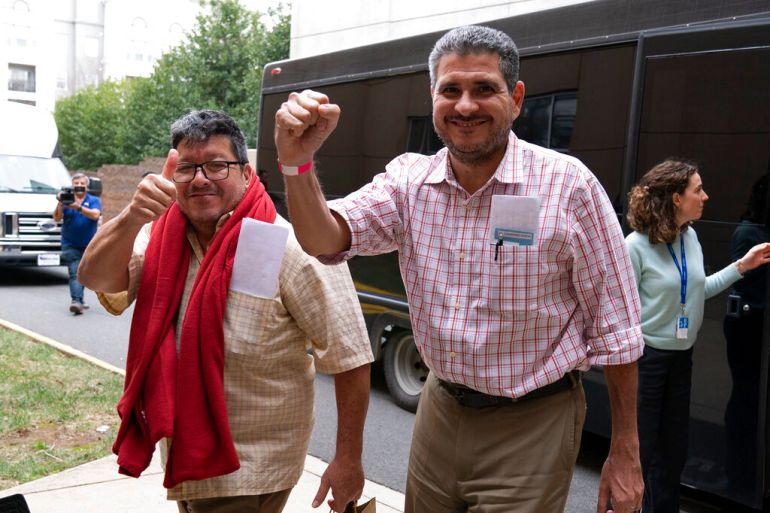Spain offers citizenship to freed Nicaraguan political prisoners
The announcement comes after Nicaragua’s legislature moved to strip released prisoners of their citizenship.

Spanish officials say they have offered citizenship to more than 200 Nicaraguan political prisoners released earlier this week, after legislators aligned with Nicaragua’s President Daniel Ortega moved to strip them of their legal status as citizens.
Spanish foreign minister Jose Manuel Albares announced the decision on Friday to the news outlet Servimedia, one day after 222 political prisoners were freed by Nicaragua and sent to the United States.
Keep reading
list of 3 itemsNicaraguan judge orders dissident bishop to stand trial
US unveils new border curbs for Haitians, Cubans, Nicaraguans
The former prisoners include opposition leaders, journalists and religious figures who have been outspoken against Ortega, a politician that human-rights groups have accused of orchestrating a violent campaign to silence his critics.
In a statement on Thursday, US Secretary of State Antony Blinken welcomed the release as a step “towards addressing human rights abuses” in Nicaragua and said it was the result of “concerted American diplomacy”.
The Ortega administration, meanwhile, has described the prisoner release as an effort to remove criminals from within Nicaragua’s borders. In televised remarks, Ortega derided the prisoners as “agents” of foreign powers, saying, “Let them have their mercenaries.”
Ortega has led a crackdown on dissent since Nicaragua was gripped by anti-government protests in April 2018.
The vote by Nicaragua’s legislature to revoke the released prisoners’ citizenship left critics in fear that the 222 people would become stateless. The decision, however, would require a constitutional change to become official, and a second vote on the citizenship issue is not likely to occur before 2024.
Albares told reporters the Spanish government made its decision to offer the former prisoners citizenship following “reports that proceedings had begun to declare them stateless”.
The prisoners have been allowed to enter the US on temporary humanitarian visas. Spanish authorities said they would reach out to the prisoners to invite them to formally apply for citizenship.
Two individuals were freed on Thursday but refused to board a plane to the US. One of them was Catholic Bishop Rolando Álvarez, who was expected to be sentenced on charges of conspiracy and spreading false information next week.
But his sentencing hearing was moved forward to Friday after the release of the prisoners. Before a Managua appeals court, chief magistrate Octavio Ernesto Rothschuh handed Álvarez a 26-year sentence — the longest prison term given to an opposition figure under Ortega’s presidency in recent years.
The court also announced that Álvarez would receive a fine and have his Nicaraguan citizenship revoked.
Álvarez, one of Ortega’s most prominent critics, has been under arrest since August when police launched a pre-dawn raid on his church residence. He declined to leave Nicaragua on Thursday without first being able to consult with his fellow bishops, a condition Ortega ridiculed as “absurd”.
The bishop is reportedly being held in the nearby Modelo prison, a facility Amnesty International has accused of torture and inhumane conditions.